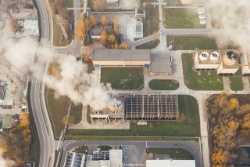Impacts of stormwater, wastewater and climate change
Stormwater, wastewater and climate
change:
Impacts on our economy, environment, culture and
society
In October 2017, the
Deep South Challenge released a report into the state of the
nation’s storm and waste water infrastructure, in the face
of a changing climate. The report garnered significant media
attention – not surprising given the infrastructure is
currently valued at well over $20 billion.
The report gathered together what we already know about how climate change is likely to affect our stormwater and wastewater systems:
• Sea level rise will affect
all coastal infrastructure and will likely result in
increasing sewage overflows, pipes corroded by salt water,
and exposure to liquefaction.
• More severe and
more frequent coastal storms will affect infrastructure,
causing increasing inundation, physical damage and
electrical failure at treatment plants.
• Changes
in extreme rainfall will overwhelm the networks, restricting
opportunities for maintenance, and increasing the
infiltration of wastewater into stormwater (with concerning
flow on effects for health, ecology, cultural and
recreational spaces, and water supply for drinking).
•
Drought will also affect networks, disrupting gravity
systems by slowing flow and leading to blocked pipes.
The report also highlighted significant gaps in our knowledge about how climate change might impact our stormwater and wastewater infrastructure, as well as in our understandings about the extent to which damage to this infrastructure might impact our economy, environment, culture and society.
The Deep South Challenge, through our Impacts and Implications programme, is now investing in research that seeks to fill these knowledge gaps.
We’ve just funded a new research project lead by consultants Tonkin + Taylor, called “Stormwater, wastewater, climate change: Impacts on our economy, environment, culture and society”. Over one year, this project aims to explore these potential impacts and to develop a detailed “theory of change”. The project is based on the idea that only once we have determined the performance we require of our storm and wastewater network in a changed climate, as well as the full range of likely impacts, can we design an efficient and effective solutions pathway.
Project leader James Hughes says, “Aside from the obvious impacts we are aware of, and those we are beginning to understand, there is so much that we actually don’t know. For someone working in this field this can be both very worrying and intriguing at the same time!”
This project will involve a comprehensive review of New Zealand and international literature, including local and regional case studies, as well as a detailed process to gather end user needs and requirements, via a panel of a key experts, including iwi representatives.
Those key experts include Blair Dickie (Environment Waikato), Gavin Palmer (Otago Regional Council), Iain White (Waikato University), Jackie Colliar (NIWA, Waikato Tainui), Mark Bishop (Watercare), Noel Roberts (Water NZ), Sue Ellen Fenelon (Ministry for the Environment), Tumanako Faaui (Ngāti Whakahemo), and Tom Cochrane (Canterbury University).
The research intends to produce a summary of the physical impacts of climate change on storm water and waste water systems, and related outcomes across social, environmental, cultural and economic domains; a summary of how these outcomes may vary across New Zealand and where these may be more likely to occur; and some guiding principles for practitioners and decision-makers in the planning and engineering sectors.
James Hughes continues: “The outcomes of research like this can have potential to offer some really practical outcomes for New Zealand towns and cities, which is what we will be aiming to achieve.”
The research team combines excellence in engineering, economics and physical science – and comprises experts from Tonkin + Taylor, NIWA and Infometrics.
For more information about the Deep
South Challenge (and particularly our Engagement and Impacts
& Implications programmes), check out our website: www.deepsouthchallenge.co.nz


 Stats NZ: Greenhouse Gas Emissions Fall 2.0 Percent In The December 2024 Quarter
Stats NZ: Greenhouse Gas Emissions Fall 2.0 Percent In The December 2024 Quarter The Reserve Bank of New Zealand: Christian Hawkesby Appointed As Governor Of The RBNZ
The Reserve Bank of New Zealand: Christian Hawkesby Appointed As Governor Of The RBNZ Kiwi Economics: It’s Mayhem In Markets As Downside Risks Dominate Following Trump’s Tariffs
Kiwi Economics: It’s Mayhem In Markets As Downside Risks Dominate Following Trump’s Tariffs Mindful Money: Consumer Demand For Ethical Investing Remains Strong Despite International Headwinds
Mindful Money: Consumer Demand For Ethical Investing Remains Strong Despite International Headwinds Greenpeace: Taranaki - Greenpeace Activists Stop Unloading Of Palm Kernel Sourced From Indonesian Rainforests
Greenpeace: Taranaki - Greenpeace Activists Stop Unloading Of Palm Kernel Sourced From Indonesian Rainforests Seafood New Zealand: Seafood Situation Saved By A Sausage - New Plymouth Locals Innovate, Using Crayfish Bait
Seafood New Zealand: Seafood Situation Saved By A Sausage - New Plymouth Locals Innovate, Using Crayfish Bait



